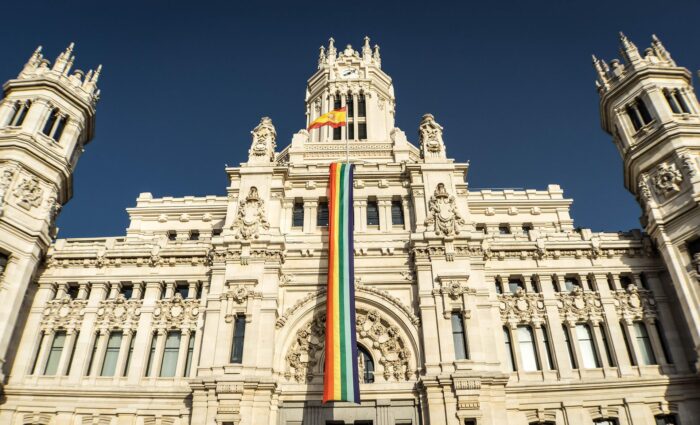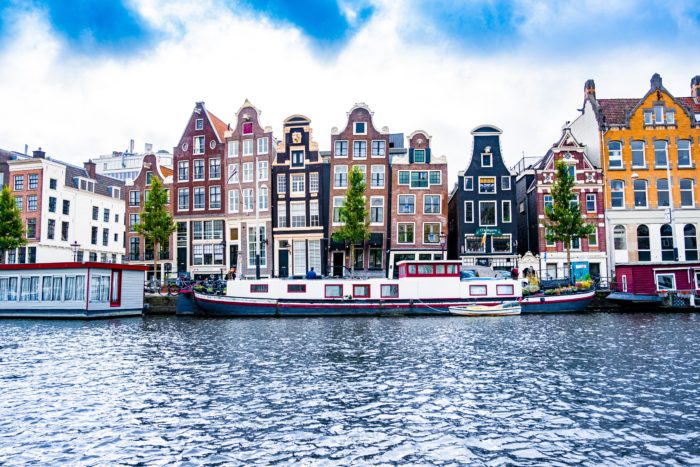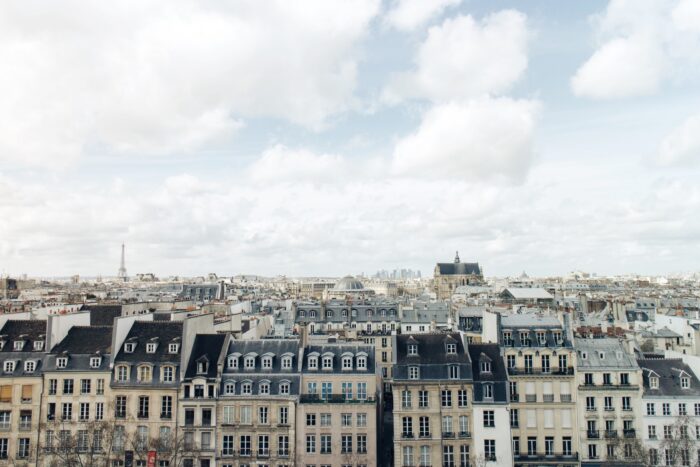Best Places to Live in Europe for LGBTQ Expats
Have you ever dreamed about living abroad? Even if just for a short time, inhabiting a life that is completely different than the one you currently occupy? Becoming a global citizen or a digital nomad can be an exciting life, but as a member of the LGBTQ community, where is the best place to go? Many countries in Europe are safe havens that provide equal rights and several protections under the law.

With over 40 countries in Europe, making a decision can feel overwhelming. But we are here to help. Using resources such as the International LGBTQ+ Travel Association, Destination Pride, and ILGA- Europe, we have evaluated the most LGBTQ-friendly countries in Europe based on their marriage equality laws, gender identity protections, and anti-discrimination laws.
LGBTQ-Friendly Countries: Why Europe?
If you’re looking to live abroad in a country with a thriving LGBTQ community, Europe is an excellent option. Steeped in history and culture, many of these countries host the world’s largest Pride Festivals and have established a precedent for LGBTQ rights. No matter where you decide to go, you’ll be greeted with the beauty of nature and stunning architecture.
Many countries in Europe, such as the Netherlands and Spain, rank consistently high in Destination Pride’s database that looks at data points including marriage equality laws, census data, and social media sentiment. The ILGA’s Rainbow Europe Map ranks 49 European countries based on how the laws and policies of each country impact the lives of LGBTQ people. This study covers everything from equality to family issues and hate speech, legal gender recognition, and freedom of expression.
While it is important to feel safe and accepted within your community, there are also many factors to consider when deciding on where you would like to relocate. These include your age, marital status, whether or not you have children, and financial position. To help you choose your destination, we give you insight into the most gay-friendly countries in Europe with strong expat communities.
Most LGBTQ-Friendly Places to Live in Europe
We have compiled a list of the ten most LGBTQ-friendly places to live in Europe. All of the countries on this list provide viable visa options for Americans to move there long-term, with the exception of Belgium, Denmark, Norway, and the United Kingdom. However, these four countries score high on the list for LGBTQ protections and overall quality of life, so we thought they would be worth considering if you have the opportunity to obtaining legal residency.

Malta
You might be surprised to find Malta at the top of this list, but this tiny archipelago in the central Mediterranean Sea is also a thriving LGBTQ destination. Malta is considered by many to be the most progressive country in Europe, and was ranked at the top of ILGA’s Rainbow Europe Map for the sixth consecutive year. Perfect for history buffs and adrenaline junkies, Malta is filled with natural splendor. Visit Valletta, Malta’s capital city, which hosts the annual Gay Pride celebration in September.
Malta has made several recent strides in enhancing LGBTQ equality, including the approval of a bill in 2014 that protects LGBTQ individuals from discrimination based on gender identity and sexual orientation. If you’re planning to move to Malta, you are entitled to several LGBTQ rights, including marriage, adoption rights to same-sex couples and LGBTQ singles, and access to in-vitro fertilization. To learn more about visa options for moving to Malta grab your copy of I’m Outta Here! An American’s Ultimate Visa Guide to Living in Europe.
The Netherlands
The Netherlands made headlines in 2001 when it became the first nation in the world to legalize same sex marriage. However, homosexuality itself was decriminalized in 1811 and the first gay bar opened in Amsterdam in 1927. Stroll along Amsterdam’s waterfront and you’ll encounter the Homomonument, a memorial for LGBTQ people who were killed by the Nazis during World War II. Pride Amsterdam, with its canal parade, is a nine-day celebration with over 300 activities and events.

With discrimination of sexual orientation in employment and housing illegal in the Netherlands, it is an attractive option for LGBTQ expats. Same sex couples can adopt or use surrogacy services, and they also enjoy equal tax and inheritance rights. Transgender adults are allowed to self-identify without a doctor’s statement, and children can change their gender. Learn more about living in the Netherlands in our complete guide for Americans.
Germany
Germany’s history with LGBTQ rights can be traced back to the late 1800s when Karl Heinrich Ulrichs, who was known as one of the first gay activists in history, gave a speech advocating for homosexual rights. At turn of 21st century, Germany introduced a “Life Partnership Law” which allowed same sex couples to have registered partnerships and receive benefits such as health insurance. The country recently appointed its first commissioner for LGBTQ affairs, with a promise to develop a national action plan to promote acceptance and protect diversity.
The capital city of Berlin is a bastion of the arts, and advocates for LGBTQ inclusion will find a home in this city. Held every year in July, Berlin’s Christopher Street Day is one of the largest gay events in Europe, held in the memory of the Stonewall Riots that occurred in New York City in 1969. Learn more about moving to Germany in our complete guide to living in Germany as an American.
Belgium
Perhaps best known for its delicious chocolate and thriving beer culture, Belgium is also a staunch supporter of LGBTQ rights. It became the second country in the world to legalize same sex marriage in 2003, and also the first European country to pass transgender and anti-discrimination laws. Belgium was the second country to decriminalize same-gender relationships back in 1795, when it was a French territory. Same sex couples can adopt and have access to in-vitro fertilization, and transgender individuals are able to change their legal gender without surgery.
Brussels has a vibrant gayborhood and a well-developed LGBTQ scene that appeals to a diverse range of orientations, while Antwerp is a progressive city with an energetic nightlife. Both cities host an array of festivals– Belgian Pride Brussels and the Unicorn Festival in Antwerp are two popular LGBTQ events.
Portugal
With over 1,100 miles of stunning coastline, abundant seafood, and fantastic wine, there is a lot to love about Portugal. The country is quite progressive when it comes to LGBTQ rights, and as a resident you would have access to same sex marriage as well as the same rights as heterosexual couples including visas, inheritance, adoption, and in-vitro fertilization.

Portugal is the oldest nation-state on the Iberian peninsula that attracts LGBTQ individuals seeking a safe place to settle. While the most LGBTQ-friendly cities tend to be larger, such as Lisbon and Porto, the Algarve in the southernmost region is also very welcoming and non-judgemental. Lisbon’s Principe Real is the most prominent LGBTQ neighborhood, and where the annual Pride March started. Don’t miss Queer Lisboa, an international gay and lesbian film festival that is held each year in September. Learn more about how to move to Portugal in our guide.
Denmark
Every year, Denmark is consistently ranked in the top three happiest countries in the world, according to the UN’s World Happiness Report. Spend some time here getting hygge with it and you’ll soon understand why. But did you know that Denmark has more than 400 islands? Less than 100 of them are actually populated, and the most famous one is Zealand, which is where Copenhagen is located. A beautiful city lined with canals and brimming with historical buildings, you’ll find cobblestone streets winding their way through romantic town squares.
Denmark was the first country in the world to recognize the union of same sex couples in 1989, and discrimination on the grounds of sexual orientation was entirely prohibited in 1996. The country has also allowed same sex couples to jointly adopt since 2010, and LGBTQ people are allowed to serve openly in the Danish military. If you’re in the Copenhagen area, two events not to miss are Copenhagen Pride and MIX Copenhagen, an LGBTQ film festival.
Norway
Like most Nordic countries, Norway has a liberal and tolerant population, which makes it easier for LGBTQ expats to adapt regardless of their origin and sexual orientation. In 1981, the country was the first to introduce anti-discrimination protections based on sexual orientation. Norway also has one of the most liberal transgender laws in the world. In 2016, the country passed a law that allows the change of legal gender solely based on self-determination. Same sex marriage, adoption, and IVF for same sex couples has been legal since 2009.
If you’re looking to celebrate Pride, visit Oslo for Skeive Dager, which attracts more than 10,000 participants each year and is one of Norway’s most popular events. The Oslo/Fusion Festival focuses on gender, sexuality, and identity, and is another annual event. A large section of Northern Norway is located in the Arctic Circle, and you can view the magical Aurora Borealis, or Northern Lights, many months of the year.
France
France is often cited as one of the most LGBTQ-friendly countries in the world. It legalized homosexuality in 1791, and in 2013 it became the thirteenth country to legalize same sex marriage. Several laws have also been passed in recent years that prohibit discrimination on the basis of sexual orientation. In 2001, Paris became the first European capital to elect an openly gay mayor, Bertrand Delanoë, and it maintains its status as the most welcoming city in France for the LGBTQ community.

Check out Le Marais in Paris’ fourth arrondissement for its popular queer scene, but you’ll also find LGBTQ-friendly venues scattered throughout Paris. The area around rue des Écouffes is known for its lesbian scene, and each June the city hosts a well-attended Gay Pride Day. There are also a variety of film festivals that occur throughout the year, including the Festival of LGBT Cultures and the Paris International Lesbian & Feminist Film Festival. Outside of Paris, visit Lyon, Marseille, and Nice for LGBTQ-friendly communities. Check our guide to living in France for Americans for more info.
Spain
What’s not to love about Spain? The third country in the world to legalize same sex marriage and adoption rights for same sex couples in 2005, it is consistently on the forefront when it comes to advancing LGBTQ rights. The country also banned employment discrimination based on sexual orientation in 1995. For a Catholic country, Spain is extremely LGBTQ-friendly, with nearly 90% of the population accepting of homosexuality according to the latest Pew Research poll. Spanish literature, cinema, and music frequently explore LGBTQ themes.
Spain’s stunning landscapes and diverse culinary offerings make it an appealing option for LGBTQ expats. Madrid and Barcelona have several gayborhoods, including Chueca in Madrid, which you enter through a rainbow-striped Metro station. “Gaixample” is a popular queer neighborhood in Barcelona. Gran Canaria, the largest of Spain’s Canary Islands, is also a world-renowned LGBTQ destination. Madrid hosts Europe’s largest annual Pride parade (MADO), where crowds swell to over two million people. If you’re interested in moving to Spain check out our complete guide for Americans.
The United Kingdom
Between 2004 and 2008, the United Kingdom passed a comprehensive set of anti-discrimination laws, which included allowing LGBTQ people to openly serve in the military. In 2013 Parliament passed the Marriage (Same Sex Couples) Act, which introduced civil marriage for same sex couples in England and Wales. It is also illegal to refuse employment, accommodation, and goods or services to LGBTQ people.
The U.K. offers so much for LGBTQ individuals, including the grandeur of Buckingham Palace in London, the gorgeous Lake District in Northern England, or the historic Stonehenge. It also has the largest number of Pride events in the world, with almost every city hosting its own event. Besides London, Brighton Pride and Manchester Pride are among the best in the world. Visit the neighborhoods of Soho, Clapham, and Vauxhall in London for a taste of the city’s LGBTQ scene.
European Countries That Are LGBTQ-Friendly
If you’re a member of the LGBTQ community and you’re thinking about moving to Europe, we recommend that you consider several factors. These factors include the laws that have been put into place to protect LGBTQ and individuals the viable options for Americans to achieve residency. If you want to learn more about the easiest countries to move to in Europe check out I’m Outta Here! An American’s Ultimate Visa Guide to Living in Europe for detailed information on the 17 easiest countries to move to based on viable visa options for Americans (there are over 50 visa options available!).
Because Europe is so diverse, certain countries may appeal more to you than others but you want to ensure there is a path for you to legally make the move. We hope that by providing this resource you will feel empowered to find a new place to call home.






3 thoughts on “Best Places to Live in Europe for LGBTQ Expats”
Just an update, as of 2023, UK is not LGBTQ friendly, with the UK parliament going so far as to block pro LGBTQ bills passed by the Scottish Parliament. I would avoid.
Thank you so much for the info!
“Transgender adults are allowed to self-identify without a doctor’s statement, and children can change their gender” is wrong in the Netherlands. A law is being discussed, but hasn’t passed yet